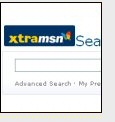Source : Search Engine Watch Microsoft has just released a public preview of its long-awaited web search technology, over a year after first embarking on the project. The company also gave a facelift to its popular MSN Search site. Though the two will eventually come together, it should be noted that these are two separate events, and that the general public search currently remains powered by Yahoo’s search technology.
Microsoft has just released a public preview of its long-awaited web search technology, over a year after first embarking on the project. The company also gave a facelift to its popular MSN Search site. Though the two will eventually come together, it should be noted that these are two separate events, and that the general public search currently remains powered by Yahoo’s search technology.
The New Engine
Hmm, well none of the moves are groundbreaking. The beta search technology shows glitches common to any new web search engine that only get worked out over time. Microsoft’s search engine isn’t a serious replacement for Google, Yahoo or Ask Jeeves yet.
Microsoft itself describes its new search technology as “raw” and admits that for various reasons, it won’t do well on some queries. Nevertheless, it is an important start. Microsoft says it sees search as a tough technology problem to take on and solve over the next five to ten years.
The new Microsoft search engine is best reached via its MSN Sandbox page here. Country specific versions are also offered, the New Zealand version appearing here. The regional versions don’t appear to be too different though.
Microsoft says the new engine’s index has about 1 billion pages, with plans to increase this size over time. That puts it behind the size of other major search engines, though it’s important to always remember that size is only one of many factors that influences how good a search engine is.
Overall, the search engine is a good first effort. Clustering is desperately needed (the idea that you only show one or two top results from any single web site.) There’s a sense that the ranking system doesn’t do quite as good of job as getting solid authority sites to the top of the list, and that it may be more susceptible to unprofessional search engine optimisation tricks.
The new search engine also leaves me with a “more of the same” feeling. It doesn’t take search results anything beyond what Yahoo, Google or Ask Jeeves already do.
The New Look
The MSN cosmetic changes here and the NZ version here are in line with what the service already said it would be doing back in March. Sadly the NZ XtraMSN version remains lacking in many of the features found in the US.
In summary, sponsored listings are now more distinguished appearing in boxes above and to the side of editorial results. The confusing “Featured Sites” area that often contained ads is gone. The result is to help more editorial results rise to the top of the results, which MSN says they’ve found improves perceived relevancy.
On the home page, the LookSmart-powered directory is now gone. That leaves the page nearly blank, making it much more Google-like in being clean. A drop down box to the right of the search box provides access to web, news, (dictionary, encyclopedia, stock quote, movie and shopping search on the US version).
Underneath the hood, the most significant change is MSN’s decision to drop paid inclusion listings (URL’s that are guaranteed inclusion somewhere in the listings for a fee). The move follows on the Ask Jeeves announcement last week that they were entirely dropping paid inclusion listings. As Google has never offered paid inclusion, this leaves Yahoo as the last major service still offering it.
How Do I Get Into MSN Search?
Well for the new engine, so far, there’s no add URL page, so as with Ask Jeeves, you have to rely on being crawled naturally. MSN says that an add URL page will be added later this year. MSN can’t yet say how often its index will be crawled and updated.
At the existing MSN Search service, the Submit a Site link on the results pages, in the top right corner, is somewhat a waste of time — merely directing you to Overture (which XtraMSN doesn’t yet support). As for the MSN.com submit URL form that some may remember, it submits your page to the Yahoo crawler, which currently powers MSN Search, MSN says.
In many ways, MSN Search is in a holding pattern until it gets a heart transplant of Microsoft’s own search technology later this year, a time Microsoft chairman Bill Gates has stated. At that time, there will almost certainly be other changes and capabilities to the site’s advanced search page or in how it operates.
